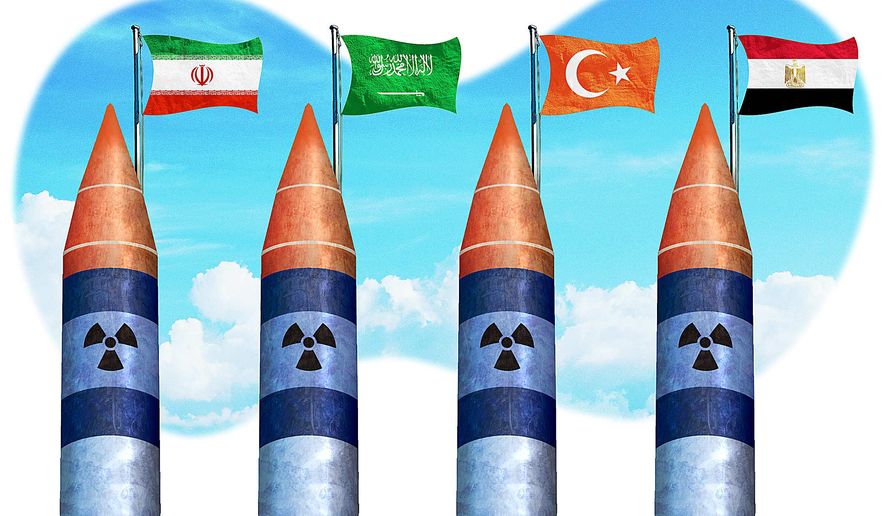OPINION:
While the future of Iran’s nuclear program has rightly been the focus of the intense Vienna negotiations, there are other significant implications extending well beyond Tehran. Because of President Obama’s many concessions, Iran has made significant gains, particularly enhanced international legitimacy for both its regime and its extensive nuclear activities.
Now that the negotiating “deadline” has been extended until June 2015, we should consider the broader global implications of Mr. Obama’s Iran policy. Other aspiring nuclear-weapons states have carefully followed the negotiations, drawing conclusions and making plans accordingly. Very shortly, the wider ripples of the talks will manifest themselves in two ways.
First, Iran’s near neighbors, including Saudi Arabia, Egypt, and Turkey, will almost certainly accelerate their nuclear activities, following a clear path to producing weapons. Second, North Korea, left to its own devices (and continuing progress on both weaponization and ballistic-missile development) these past six years, clearly sees a weak negotiating counterpart in Washington, and will try to achieve many of the same advantages Tehran is now harvesting.
The Middle Eastern conventional wisdom has long held that if Iran produced deliverable nuclear weapons, other states would follow inexorably. As then-Secretary of State Hillary Clinton said in 2009, “A nuclear-armed Iran with a deliverable weapons system is going to spark an arms race in the Middle East and the greater region.” Saudi Arabia will move first. Indeed, the Saudis may already have “options” on existing Pakistani warheads, meaning that Riyadh would not need to build its own nuclear program, but could effectively become a nuclear power overnight. Egypt and Turkey would start farther behind, but they have already made initial efforts, such as Cairo’s 2013 nuclear deal with Moscow.
Iran’s path to weaponization appears now to be merely a matter of its own timing, absent an Israeli military strike like those undertaken previously against Iraq and Syria. Accordingly, none of the potential proliferators have any incentive to wait for Iran to actually test a nuclear device to prove its existence. These regional powers will almost certainly conclude that Iran will weaponize, and that having their own deterrent capability is the only appropriate response. Indeed, with Washington accepting Iran’s “peaceful” program, these and others could move very quickly. They will definitely not rely solely on U.S. assurances. Given how meaningless Mr. Obama’s Iran assurances were, the other potential proliferators will not bother with subtlety as they proceed.
North Korea obviously stands in a very different position, having itself already detonated three nuclear devices. While the White House has (so far, at least) not chased Pyongyang for a nuclear agreement as it has Tehran, the North’s nuclear threat has nonetheless grown. Both its ballistic-missile program and the critical miniaturization of nuclear weapons into warheads mated with such missiles for long-range, even worldwide delivery, have proceeded rapidly. Curtis Scaparrotti, commander of U.S. forces in Korea, said in October, “I believe they have the capability to miniaturize the device at this point and they have the technology to potentially actually deliver what they say they have.”
Pyongyang could readily conclude, based on Iran’s successes, that Mr. Obama’s remaining two years provide the most propitious period in which to make a nuclear deal with Washington. Having already twice expelled International Atomic Energy Agency (IAEA) inspectors, most recently in 2009, the North can go a long way simply by allowing IAEA renewed access to the known facilities at Yongbyong. Of course, since everything important in North Korea’s ongoing weapons-related program in undoubtedly well concealed far from that location, Pyongyang’s risks could be manageable. Given the gullibility of Mr. Obama’s negotiators, the omens are good for a North Korean initiative.
There are additional negative consequences. Beyond Russia’s Egypt deal, Moscow signed a significant commercial agreement with Iran in 2014 to build eight new nuclear reactors, in addition to the already-functioning Bushehr facility. Additional sales throughout the Middle East and beyond are tempting prospects. Moreover, Russia has also allowed (or encouraged) its citizens to be employed “individually” by would-be proliferators as nuclear and ballistic-missile experts. This ploy has allowed Moscow to evade either responsibility or consequences, but nonetheless forms a worldwide proliferation pattern. And while A.Q Khan’s nuclear-enrichment business was brought to a crashing halt in 2004, other entrepreneurs could logically conclude that demand for their skills will rise significantly in coming years.
Finally, much of the damage done by the Obama administration cannot be easily repaired. Once a proliferator crosses key thresholds, the work cannot be rolled back except through a strategic decision to abandon the pursuit of nuclear weapons. While this has happened before (such as South Africa after apartheid), it typically requires regime change for a new government to have the courage and political space to reverse course. Unfortunately, therefore, Mr. Obama’s dangerous nuclear legacy will inevitably be high on the agenda of repair work for his successor.
• John R. Bolton, a former U.S. ambassador to the United Nations, is a senior fellow at the American Enterprise Institute.




Please read our comment policy before commenting.